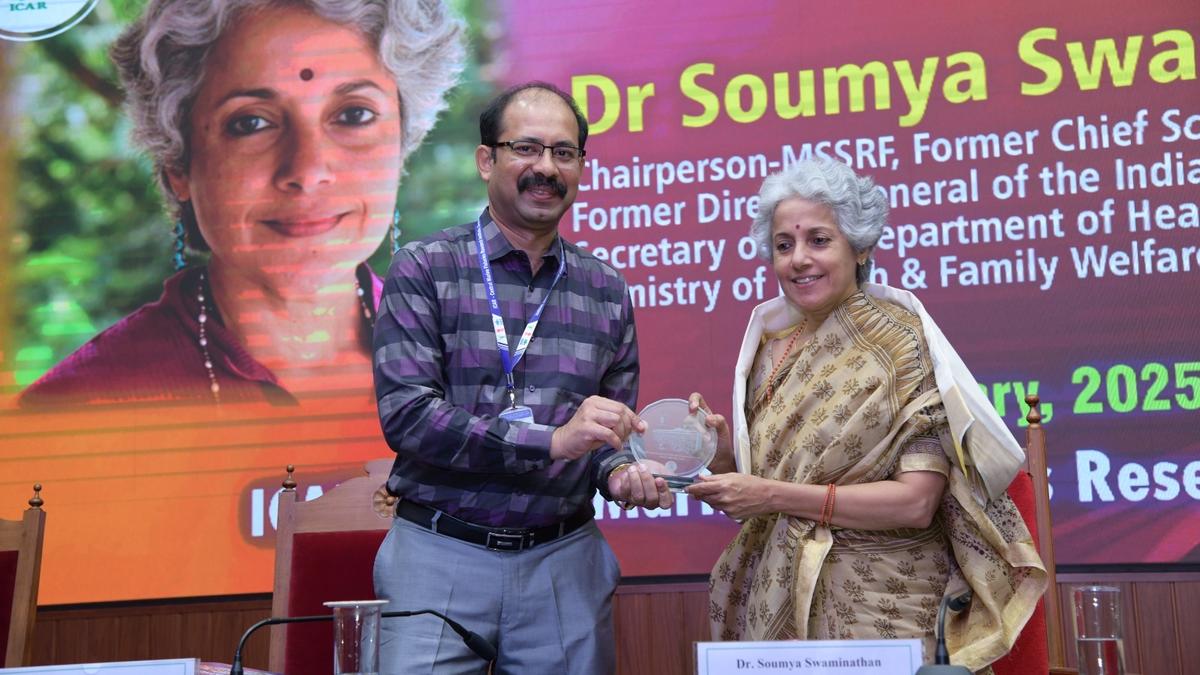
Zoonotic diseases, climate change, dietary risks posing threat to human health, says Soumya Swaminathan
The Hindu
Dr. Soumya Swaminathan discusses zoonotic infections, climate change, and dietary risks, emphasizing the need for integrated research and collaboration.
Most of the emerging viral threats are zoonotic infections that are transmitted from animals to humans, Dr. Soumya Swaminathan, former Chief Scientist of the World Health Organisation (WHO) and chairperson of M.S. Swaminathan Research Foundation, said on Friday (January 24).
She was referring to challenges to human health amid a series of issues, including climate change and anti-microbial resistance, after the launch of various initiatives undertaken as part of a major research project on water quality assessment of Vembanad lake and waterborne infectious diseases, at the Central Marine Fisheries Research Institute (CMFRI) here. Ms. Swaminathan, who is also the former Director-General of the Indian Council of Medical Research (ICMR), emphasised the critical role of integrated research, including data from weather, climate, health, and environmental sources, to predict and prevent the outbreak of infectious diseases. Most of today’s health threats originated from environmental factors, she said, and suggested establishing an environmental health regulatory agency in the country.
Dr. Swaminathan further pointed to dietary risks as the number one health threat in the country. “Half of Indians cannot afford a nutritionally sufficient healthy diet. Kerala and Tamil Nadu are experiencing a concerning rise in obesity and non-communicable diseases, alongside persistent issues like malnutrition, anaemia, and micronutrient deficiencies, all stemming from unhealthy dietary habits,” she said.
Emphasising the potential of marine resources as a healthy diet component to improve nutrition, she said people were yet to fully utilise such resources to address critical dietary issues.
Underscoring the devastating impact of climate change, she said India was one of the most vulnerable countries. “Almost the entire population of the country is being exposed to at least one of the climate hazards such as floods, droughts, cyclones, and extreme heat. Heat is most dangerous to both physical and mental health. The weakest sections of society bear the brunt of these hazards, and there is need for adaptation strategies and resilience-building measures,” she observed.
Ms. Swaminathan stressed the importance of collaboration among government research agencies, academia, and the community since citizen science initiatives were crucial to empowering communities and gathering valuable data. “During COVID-19, I believe nobody anticipated the development of vaccines within a year. It was a remarkable achievement facilitated by unprecedented collaboration and data-sharing among research institutions and scientists,” she said.
On the challenge posed by the flooding of information, Dr. Swaminathan said in the digital age misinformation was fast spreading across social media platforms. This could hinder scientific progress and public health efforts. This was evident during the COVID-19 pandemic when everybody disguised themselves as ‘experts’ and offered advice to people.













